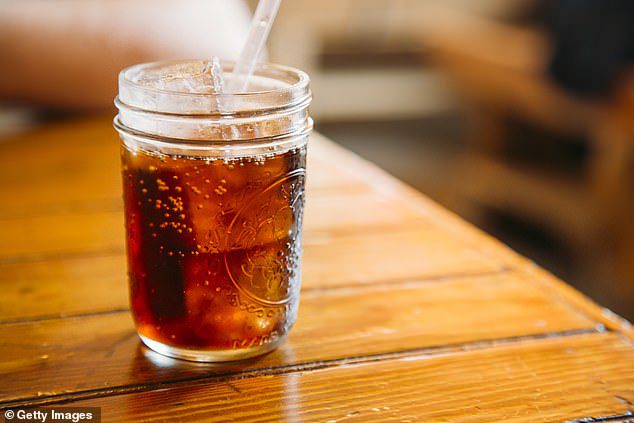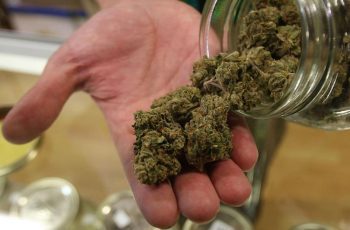Just two glasses of diet drink a day increases the risk of early death, a World Health Organisation study has shown.
The global study of more than 450,000 adults in 10 countries – including the UK – found that daily consumption of all types of soft drinks was linked with a higher chance of dying young.
But the rates for those drinking artificially-sweetened beverages were significantly higher than those consuming full sugar versions.
The scientists, from the WHO International Agency for Research on Cancer in Lyon, said it would be ‘prudent’ to cut out all soft drinks and have water instead.
And they said taxing sugary drinks – as is done in the UK – could boost diet drink uptake for which the ‘long-term’ health implications’ are unknown.
Experts speaking at the European Society of Cardiology in Paris said people should ‘eliminate’ soft drinks from their diet.
The research, published in the JAMA Internal Medicine journal, is the largest study to examine links between soft drink consumption and mortality.
Previous smaller studies have suggested a link, but have not found such dramatic differences.
The new research found those who consumed two or more 250ml glasses of diet drink a day had a 26 per increased risk of dying within the next 16 years.
And deaths from cardiovascular disease went up 52 percent.
For those who had two or more sugary soft drinks a day, the risk of death in the same period was raised by eight percent.
Study leader Dr Neil Murphy, said: ‘The striking observation in our study was that we found positive associations for both sugar-sweetened and artificially-sweetened soft drinks with the risk of all-cause deaths.’
He said it is ‘unclear’ exactly why this is, but pointed to previous studies which suggest the artificial sweeteners in diet drinks ‘may induce glucose intolerance’ and trigger high blood insulin levels.
‘Additional studies are now needed to examine the long term health consequences of specific artificial sweeteners that are commonly used in soft drinks, such as aspartame and acesulfame potassium,’ he said.
Similar studies in the past have been criticized because experts said people who drink diet products are more likely to be unhealthy to start with.
But the new study found the link between diet drinks and death rates persisted among those of a healthy weight.
The study also raised concerns about policies that drive people from sugary drinks to diet drinks.
The authors wrote: ‘Reformulation of sugar-sweetened soft drinks, in which sugar is replaced with low- or no-calorie sweeteners, is being driven by consumer awareness and fiscal instruments, such as taxes.
‘Artificially sweetened soft drinks have few or no calories; however, their long-term physiological and health implications are largely unknown.’

The global study of more than 450,000 adults in 10 countries – including the UK – found that daily consumption of all types of soft drinks was linked with a higher chance of dying young
Stroke specialist Professor Mitchell Elkind, president-elect of the American Heart Association, speaking in Paris, said: ‘This study is important. It’s a very big study and includes many countries.
‘The take-home message is drink water – certainly, avoid sugar-sweetened beverages and be cautious about artificially sweetened beverages.
‘Water is the safest thing. Tea and coffee are OK. But minimize or completely eliminate processed beverages.
‘It’s difficult to change behavior but studies like this help.’
Professor Jeremy Pearson, associate medical director at the British Heart Foundation, said: ‘We’re all too familiar with the fact that sugary drinks are not only bad for our teeth, but the excess calories can also make us put on weight, increasing our risk of a heart attack or stroke.
‘Where you can, stick with water and unsweetened tea or coffee, and keep soft drinks as a treat.’
Gavin Partington, director-general of the British Soft Drinks Association, said: ‘This study reports a possible association between higher consumption of soft drinks and an increased risk of mortality, but does not provide evidence of cause, as the authors readily admit.
‘Soft drinks are safe to consume as part of a balanced diet.
‘According to all leading health authorities in the world, as well as Cancer Research UK and Diabetes UK, low- and no-calorie sweeteners are safe.’
If you know someone who might like this, please click “Share”!




